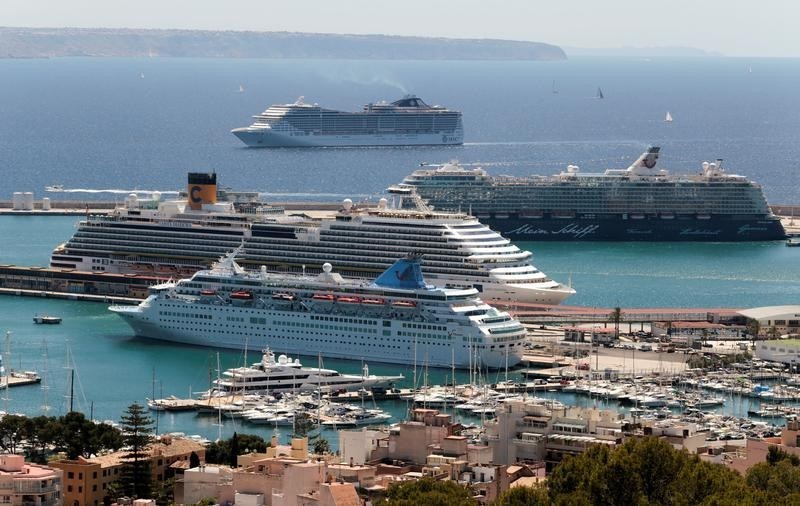By Geoffrey Smith
Investing.com -- Can private business survive the Coronavirus crisis without government bailouts? The answer should become clear in the course of the day as cruise line operator Carnival (LON:CCL) tries to raise $6 billion from the debt and equity markets.
Carnival’s case is interesting because it’s unable to call significantly on any government to help it. Listed in New York and London but registered in Panama, it will not be eligible for any of the economic support packages passed by the U.S. and U.K. governments. The capital raising will stand or fall entirely on the willingness of private investors to judge the outlook for long-term returns and look through its short-term troubles.
Those troubles are huge. The company has been forced to suspend all sailings after its cruise ships suffered multiple outbreaks of the fatal disease, crippling its ability to generate revenue to service its debts.
Those episodes were amplified by the concentration of vulnerable elderly passengers, the terrifying confinement of a closed environment and intense media coverage that revelled in the irony of the ‘dream turned into nightmare’ narrative. And it still has over 6,000 passengers at sea, including on the stricken Zaandam, operated by its Holland America line.
No wonder Carnival (NYSE:CCL) stock is down over 75% since the outbreak began.
The company has $1.83 billion in debt falling due this year and $1.92 billion due next year, as well as heavy commitments to pay for new ships that – in happier times – it considered a safe bet ($2.8 billion this year and $5.9 billion in subsequent years).
The company had already drawn down its existing $3 billion credit line in mid-March. At that time, it had tried to play down the ship commitments by saying they probably wouldn’t be delivered on time anyway because the virus would also stop shipyards delivering them, which is probably true enough but unlikely to be enough reassurance in the current circumstances.
Bloomberg reported that the $3 billion senior note offering that makes up half of the capital raise is being marketed with a 12.5% coupon, despite being secured against the company’s prime operating assets, its ships, and despite having a three-year maturity.
Together with the $1.75 billion of convertibles that are being offered, and $2.2 billion in already-existing commitments, that creates a pretty steep refinancing cliff in three years’ time.
The company, at least, seems to be assuming that three years will be enough for the world to forget Covid-19 and allow it to return to its previous growth trajectory. That seems ambitious, to say the least.
The parallel with EasyJet (LON:EZJ), another leisure-focused travel company beset by heavy commitments for expanding capacity, is instructive. EasyJet founder Stelios Hagi-Ioannou threatened on Monday to sack every non-executive director at the airline, one by one, if it didn’t get out of crippling contracts to pay for new Airbus aircraft that (Sir Stelios says) it no longer needs.
Carnival’s latest regulatory announcements give no hint that it is thinking of abandoning its ship orders. There may yet be a case for investing in Carnival, but surely not without some guarantee of more realistic use of investor capital.
